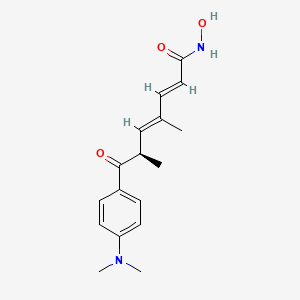trichostatin A
Trichostatin is a lipid of Polyketides (PK) class. Trichostatin is associated with abnormalities such as Dentatorubral-Pallidoluysian Atrophy, PARAGANGLIOMAS 3, abnormal fragmented structure, Disintegration (morphologic abnormality) and Hyperostosis, Diffuse Idiopathic Skeletal. The involved functions are known as Acetylation, Cell Differentiation process, histone modification, Gene Silencing and Transcriptional Activation. Trichostatin often locates in CD41a, Hematopoietic System, Chromatin Structure, Blood and Endothelium. The associated genes with Trichostatin are SPI1 gene, CELL Gene, Chromatin, CXCR4 gene and DNMT1 gene. The related lipids are Butyrates, Promega, butyrate, Lipopolysaccharides and Steroids. The related experimental models are Knock-out, Mouse Model, Xenograft Model and Cancer Model.
References related to functions published in Cancer Res.
| PMID | Journal | Published Date | Author | Title |
|---|---|---|---|---|
| 21978933 | Cancer Res. | 2011 | Ward Y et al. | LPA receptor heterodimerizes with CD97 to amplify LPA-initiated RHO-dependent signaling and invasion in prostate cancer cells. |
| 11245429 | Cancer Res. | 2001 | Zhu WG et al. | DNA methyltransferase inhibition enhances apoptosis induced by histone deacetylase inhibitors. |
| 10945620 | Cancer Res. | 2000 | Badia E et al. | Long-term hydroxytamoxifen treatment of an MCF-7-derived breast cancer cell line irreversibly inhibits the expression of estrogenic genes through chromatin remodeling. |
| 9927053 | Cancer Res. | 1999 | Saunders N et al. | Histone deacetylase inhibitors as potential anti-skin cancer agents. |
| 15313918 | Cancer Res. | 2004 | Myzak MC et al. | A novel mechanism of chemoprotection by sulforaphane: inhibition of histone deacetylase. |
| 19047136 | Cancer Res. | 2008 | Setiadi AF et al. | Epigenetic enhancement of antigen processing and presentation promotes immune recognition of tumors. |
| 20332239 | Cancer Res. | 2010 | Majid S et al. | Regulation of minichromosome maintenance gene family by microRNA-1296 and genistein in prostate cancer. |
| 18172295 | Cancer Res. | 2008 | Heller G et al. | Genome-wide transcriptional response to 5-aza-2'-deoxycytidine and trichostatin a in multiple myeloma cells. |
| 15781649 | Cancer Res. | 2005 | Bai J et al. | Predominant Bcl-XL knockdown disables antiapoptotic mechanisms: tumor necrosis factor-related apoptosis-inducing ligand-based triple chemotherapy overcomes chemoresistance in pancreatic cancer cells in vitro. |
| 15753377 | Cancer Res. | 2005 | Mori T et al. | Epigenetic up-regulation of C-C chemokine receptor 7 and C-X-C chemokine receptor 4 expression in melanoma cells. |
| 15604258 | Cancer Res. | 2004 | Bayart E et al. | A major role for mitotic CDC2 kinase inactivation in the establishment of the mitotic DNA damage checkpoint. |
| 16322213 | Cancer Res. | 2005 | Wei M et al. | BRCA1 promoter methylation in sporadic breast cancer is associated with reduced BRCA1 copy number and chromosome 17 aneusomy. |
| 16357148 | Cancer Res. | 2005 | Noh EJ et al. | Methyl CpG-binding domain protein 3 mediates cancer-selective cytotoxicity by histone deacetylase inhibitors via differential transcriptional reprogramming in lung cancer cells. |
| 16103091 | Cancer Res. | 2005 | Blagosklonny MV et al. | Depletion of mutant p53 and cytotoxicity of histone deacetylase inhibitors. |
| 15899819 | Cancer Res. | 2005 | Ho WC et al. | Nuclear factor-kappaB induced by doxorubicin is deficient in phosphorylation and acetylation and represses nuclear factor-kappaB-dependent transcription in cancer cells. |
| 15899836 | Cancer Res. | 2005 | Tran T et al. | Enhancement of folate receptor alpha expression in tumor cells through the glucocorticoid receptor: a promising means to improved tumor detection and targeting. |
| 16885346 | Cancer Res. | 2006 | Kim TY et al. | Epigenomic profiling reveals novel and frequent targets of aberrant DNA methylation-mediated silencing in malignant glioma. |
| 16818622 | Cancer Res. | 2006 | Lau QC et al. | RUNX3 is frequently inactivated by dual mechanisms of protein mislocalization and promoter hypermethylation in breast cancer. |
| 16818640 | Cancer Res. | 2006 | Foltz G et al. | Genome-wide analysis of epigenetic silencing identifies BEX1 and BEX2 as candidate tumor suppressor genes in malignant glioma. |
| 16818643 | Cancer Res. | 2006 | Mori T et al. | Estrogen receptor-alpha methylation predicts melanoma progression. |
| 16778215 | Cancer Res. | 2006 | Sharma D et al. | Restoration of tamoxifen sensitivity in estrogen receptor-negative breast cancer cells: tamoxifen-bound reactivated ER recruits distinctive corepressor complexes. |
| 16707423 | Cancer Res. | 2006 | Ibanez de Caceres I et al. | Identification of novel target genes by an epigenetic reactivation screen of renal cancer. |
| 18757430 | Cancer Res. | 2008 | Kim M et al. | LRRC3B, encoding a leucine-rich repeat-containing protein, is a putative tumor suppressor gene in gastric cancer. |
